assassination
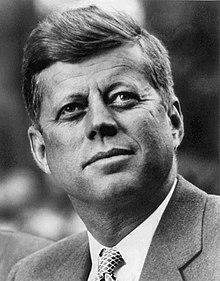 When President Kennedy was assassinated in Dallas, Texas on November 22, 1963, I was just a little girl of 8 years. I vividly remember how I found out about it. A neighbor girl came running across the street from her house to mine. I was on my way to meet her. It was in the middle of the street that I heard the news…our President had been assassinated. I was horrified, like most Americans were that day. It all seemed too impossible to comprehend. I knew nothing of politics back then, of course, I just knew that something horrible had happened to my country…the whole country. A nation doesn’t lose a president for any reason and not suffer from that loss. The loss of the president…the only president lost during office in my entire lifetime…not that attempts weren’t made or threatened, was so shocking to me. It’s something I will never forget.
When President Kennedy was assassinated in Dallas, Texas on November 22, 1963, I was just a little girl of 8 years. I vividly remember how I found out about it. A neighbor girl came running across the street from her house to mine. I was on my way to meet her. It was in the middle of the street that I heard the news…our President had been assassinated. I was horrified, like most Americans were that day. It all seemed too impossible to comprehend. I knew nothing of politics back then, of course, I just knew that something horrible had happened to my country…the whole country. A nation doesn’t lose a president for any reason and not suffer from that loss. The loss of the president…the only president lost during office in my entire lifetime…not that attempts weren’t made or threatened, was so shocking to me. It’s something I will never forget.
After the assassination, there was much controversy about what happened. Immediately…as always happens when anything big happens, there is a special commission appointed to find out what happened. I can see how that is important sometimes, but I don’t know that I think these commissions are always unbiased. As with most events such as these, there were, and still are, many people who do not think that Lee Harvey Oswald acted alone…or that he was even involved at all. Seven days after the assassination, Johnson appointed the President’s Commission on the Assassination of President Kennedy to investigate Kennedy’s death, and on this day, September 24, 1964, the Warren Commission, headed up by Chief Justice Earl Warren, gave their report to President Lyndon B 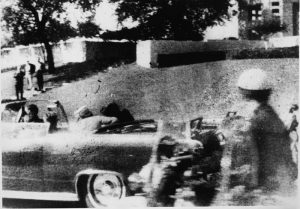 Johnson, who had been vice-president to President Kennedy, and therefore became president upon his death.
Johnson, who had been vice-president to President Kennedy, and therefore became president upon his death.
Following the report, those who disagreed thought that the whole thing was a conspiracy. The conspiracy theories were many, including the Mob, Cuban exiles, military leaders, the secret service, and even Lyndon Johnson. The Warren Commission concluded that Oswald was the “lone gunman” in the assassination, but that failed to satisfy some who witnessed the attack and others whose research found conflicting details in the commission’s report. Critics of the Warren Commission’s report believed that additional ballistics experts’ conclusions and a home movie shot at the scene disputed the theory that three bullets fired from Oswald’s gun could have caused Kennedy’s fatal wounds as well as the injuries to Texas Governor John Connally, who was riding with the president in an open car as it traveled through Dallas’ Dealey Plaza that day. Eventually, another congressional investigation was conducted in 1979, but that committee reached the same conclusion as the Warren Commission. During its almost year-long investigation, the Warren Commission reviewed reports by the Federal Bureau of Investigation, Secret Service, Department of State and the attorney general of Texas. It also pored over Oswald’s personal history, political affiliations 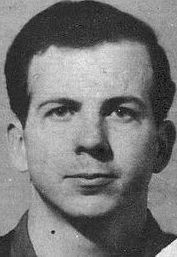 and military record. The Warren Commission listened to the testimony of 552 witnesses and even traveled to Dallas several times to visit the site where Kennedy was shot.
and military record. The Warren Commission listened to the testimony of 552 witnesses and even traveled to Dallas several times to visit the site where Kennedy was shot.
The enormous volume of documentation from the investigation was placed in the National Archives and much of it is now available to the public. Access to Kennedy’s autopsy records, though, are highly restricted. To view them requires membership in a presidential or congressional commission or the permission of the Kennedy family. I am one of those who find the conclusion of the Warren Commission to be…very simplistic, and hard to believe. I have watched several documentaries about the assassination, including the video of the actual event, and it just doesn’t make sense. Be that as it may, the commissions have spoken, and nothing more will ever be done about it. The many people involved are all gone now, so there is no one to say what really happened. So we only know what we have been told, but most of it doesn’t make sense to me.
 Everyone knows that President Lincoln was assassinated on Good Friday, April 14, 1865, while attending the play Our American Cousin at Ford’s Theatre in Washington, DC, as the Civil War was drawing to a close, but what you may not know is that this was not the first attempt on Abraham Lincoln’s life. The first attempt came one August night in 1864, just under a year before the successful attempt by John Wilkes Booth. It is unknown who the would-be assassin was in that earlier attempt, just that they very nearly succeeded.
Everyone knows that President Lincoln was assassinated on Good Friday, April 14, 1865, while attending the play Our American Cousin at Ford’s Theatre in Washington, DC, as the Civil War was drawing to a close, but what you may not know is that this was not the first attempt on Abraham Lincoln’s life. The first attempt came one August night in 1864, just under a year before the successful attempt by John Wilkes Booth. It is unknown who the would-be assassin was in that earlier attempt, just that they very nearly succeeded.
President Lincoln and his family often stayed at the Soldiers’ Home during the summer months due to the unbearable heat at the White House. President Lincoln often made the 4 mile trip from the White House to the Soldiers’ Home alone, and often late at night, an unheard of situation these days, with the secret service officers always shadowing the presidents, vice-presidents, and their families. As Lincoln was riding along that night, a shot rang out. Private John W Nichols, who was stationed at the Soldiers’ Home, rushed to the aid of the president, whom he found well, but missing his hat. President Lincoln told the private that the horse jerked upon hearing the gunshot, and his hat went flying. The private went to retrieve the hat for the president, and went he 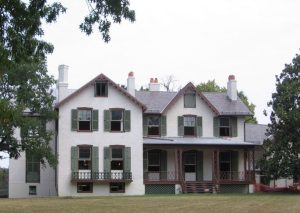 examined it, he found that it now had a bullet hole in it. It was an extremely close call, but President Lincoln requested that the matter be kept quiet, and Private Nichols didn’t tell the story until 1867. His tall hat had saved his life by causing the would be assassin to aim too high to hit his head.
examined it, he found that it now had a bullet hole in it. It was an extremely close call, but President Lincoln requested that the matter be kept quiet, and Private Nichols didn’t tell the story until 1867. His tall hat had saved his life by causing the would be assassin to aim too high to hit his head.
For America, this missed shot changed history. Had Lincoln been killed on that August night…even just that much earlier would have had devastating consequences for America. Hannibal Hamlin would have become a lame duck president. Hamlin was already off the Union ticket for vice president, having been replaced by Andrew Johnson. Hamlin would have faced strong opposition, because at the time, the Radical Democracy Party…an offshoot of the Republicans…and their nominee, John Fremont, had not yet dropped from the race. The Radical Democracy Party were even more strongly opposed to slavery than Lincoln, which is what led to their formation. Had the assassin aimed a bit lower in 1864, the election in November would likely have pitted Hamlin against Fremont and McClellan, the Democratic nominee, with Johnson perhaps running on the Union ticket.
Presidential elections always rest on who can win in an election, and in this case the winner would have turned 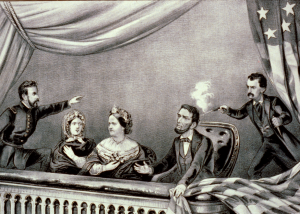 1864 America into a mess. Had the earlier would-be assassin’s shot been just a little lower, Lincoln, would have been succeeded by Hannibal Hamlin which may have given the upcoming election to Lincoln’s overly cautious former commander, General George McClellan. How either Hamlin, had he actually won re-election, or McClellan would have carried on the last year of the war, much less dealt with southern reconstruction, is a source for debate. Lincoln’s death, if combined with a lame-duck Hamlin and a conciliatory McClellan, might have encouraged the South to hold on just a while longer and resulted in an armistice rather than a victory, dramatically changing the history of America. I don’t think that anyone but Lincoln could have freed the slaves at that time.
1864 America into a mess. Had the earlier would-be assassin’s shot been just a little lower, Lincoln, would have been succeeded by Hannibal Hamlin which may have given the upcoming election to Lincoln’s overly cautious former commander, General George McClellan. How either Hamlin, had he actually won re-election, or McClellan would have carried on the last year of the war, much less dealt with southern reconstruction, is a source for debate. Lincoln’s death, if combined with a lame-duck Hamlin and a conciliatory McClellan, might have encouraged the South to hold on just a while longer and resulted in an armistice rather than a victory, dramatically changing the history of America. I don’t think that anyone but Lincoln could have freed the slaves at that time.
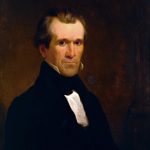 I was looking at a fact site last night, and found a list of unusual facts about the presidents of the United States. While the facts about each president were everything from strange, to bizarre, to amazing, I found myself drawn to what I read about James K Polk, who happens to be the 2nd cousin 1x removed of the husband of my 5th cousin 2x removed. That sounds very confusing to people, and I can say that it is confusing to me too. Nevertheless, my family and my husband, Bob’s family trees are intertwined, and that is a fact I have known for a while now. James Polk is just another in the line of people we are both connected to. Those are the facts I knew about James K Polk…as well as, the fact that his middle name is Knox and that is how he is related to Bob’s side of our family. My own connection comes from the Allen side of my dad’s family…and that I did not know before.
I was looking at a fact site last night, and found a list of unusual facts about the presidents of the United States. While the facts about each president were everything from strange, to bizarre, to amazing, I found myself drawn to what I read about James K Polk, who happens to be the 2nd cousin 1x removed of the husband of my 5th cousin 2x removed. That sounds very confusing to people, and I can say that it is confusing to me too. Nevertheless, my family and my husband, Bob’s family trees are intertwined, and that is a fact I have known for a while now. James Polk is just another in the line of people we are both connected to. Those are the facts I knew about James K Polk…as well as, the fact that his middle name is Knox and that is how he is related to Bob’s side of our family. My own connection comes from the Allen side of my dad’s family…and that I did not know before.
James K Polk was the first president to be elected under the age of 50, and the youngest to die, with the exception of Garfield and Kennedy, both of whom were assassinated. Polk had surgery at the age of 17, to remove stones from his bladder. This was before anesthesia was invented, so he was awake for the entire 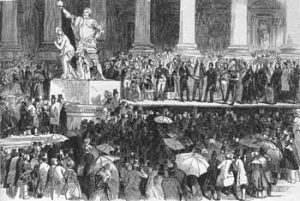 procedure. I can’t imagine how painful that must have been. Polk is the only Speaker of the US House of Representatives to become President of the United States. His years as president were active ones. They saw three states added to the nation, the first Women’s Rights Convention was held, the sewing machine, gas lighting, and the rotary printing press were invented, and the Gold Rush began. Polk was a highly motivated president, and it is believed that he worked so hard while serving as president that he weakened himself, causing his death shortly after leaving office.
procedure. I can’t imagine how painful that must have been. Polk is the only Speaker of the US House of Representatives to become President of the United States. His years as president were active ones. They saw three states added to the nation, the first Women’s Rights Convention was held, the sewing machine, gas lighting, and the rotary printing press were invented, and the Gold Rush began. Polk was a highly motivated president, and it is believed that he worked so hard while serving as president that he weakened himself, causing his death shortly after leaving office.
Polk had just two years of formal schooling prior to entering the University of North Carolina as a sophomore. He was a member of a debating society in college, and he found that he had an interest in law and government. Polk graduated with top honors in mathematics and the classics. Then he returned home to Tennessee to become a lawyer. To receive legal training, he worked in the office of Nashville trial attorney, Felix Grundy and then served as clerk of the Tennessee Senate. Polk was diligent and ambitious, and soon 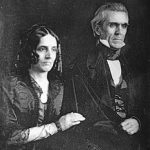 established a law practice in Columbia, Tennessee. At 27 years of age, Polk’s interests turned to politics, and he defeated an incumbent for a seat in the Tennessee Legislature. During his time as state representative, he met and eventually married Sarah Childress, who was the very intelligent daughter of a Murfreesboro merchant. She was well educated and her social grace impressed their peers. She became her husband’s personal and political confidant, it was her involvement in his campaigns that helped to ensure his victories. Fervently supporting the policies of fellow Tennessee Democrat Andrew Jackson, Polk was elected to the United States Congress at 29. His Congressional career lasted 14 years and included two terms as Speaker of the House. He must have been well liked to then go on the become President of the United States as well.
established a law practice in Columbia, Tennessee. At 27 years of age, Polk’s interests turned to politics, and he defeated an incumbent for a seat in the Tennessee Legislature. During his time as state representative, he met and eventually married Sarah Childress, who was the very intelligent daughter of a Murfreesboro merchant. She was well educated and her social grace impressed their peers. She became her husband’s personal and political confidant, it was her involvement in his campaigns that helped to ensure his victories. Fervently supporting the policies of fellow Tennessee Democrat Andrew Jackson, Polk was elected to the United States Congress at 29. His Congressional career lasted 14 years and included two terms as Speaker of the House. He must have been well liked to then go on the become President of the United States as well.
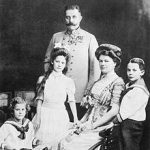
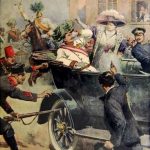 It’s amazing to me that one act of hate can bring so many people to war, but that was what happened with World War I. On June 28, 1914, Archduke Franz Ferdinand of Austria, and his wife, Sophie, Duchess of Hohenberg, were assassinated by a Serbian nationalist in Sarajevo, Bosnia. The assassin, Gavrilo Princip was an ethnic Serb and Yugoslav nationalist from the group Young Bosnia, which was supported by the Black Hand, a nationalist organization in Serbia. The outraged Austrian people and its government threatened mobilization of troops to seek vengeance for their beloved leader and his family.
It’s amazing to me that one act of hate can bring so many people to war, but that was what happened with World War I. On June 28, 1914, Archduke Franz Ferdinand of Austria, and his wife, Sophie, Duchess of Hohenberg, were assassinated by a Serbian nationalist in Sarajevo, Bosnia. The assassin, Gavrilo Princip was an ethnic Serb and Yugoslav nationalist from the group Young Bosnia, which was supported by the Black Hand, a nationalist organization in Serbia. The outraged Austrian people and its government threatened mobilization of troops to seek vengeance for their beloved leader and his family.
The crisis escalated as the conflict between Austria-Hungary and Serbia came to involve Russia, Germany, France, and ultimately Belgium and Great Britain. By mid-August of 1914, the crisis had become a full blown war, with Germany, Austria Hungary and the Ottoman Empire, known as the Central Powers, against Great Britain, France, Russia, Italy and Japan, the Allied Powers. The United States would also enter the war as a part of the Allied Powers in 1917. Other factors came into play during the diplomatic crisis that preceded the war, such as misperceptions of intent in that Germany believed that Britain would remain neutral, the belief that war was inevitable, and the speed of the crisis, which was exacerbated by delays and misunderstandings in diplomatic communications. The four years of the Great War…as it was dubbed…saw unprecedented levels of carnage and destruction, thanks to grueling trench warfare and the introduction of modern weaponry such as machine guns, tanks and chemical weapons. By the time World War I ended in the defeat of the Central Powers in November 1918, more than 9 million soldiers had been killed and 21 million more wounded.
Evil exists in this world, and it gets worse every day, and assassinations are not new. Chanakya, 350–283 BC, an Indian teacher, philosopher and royal advisor, wrote about assassinations in detail in his political treatise Arthashastra. Later, his student Chandragupta Maurya, the founder of the Maurya Empire of India, made use of assassinations against some of his enemies, including two of Alexander’s generals Nicanor and Philip. I suppose it should not be a surprise, yet every assassination brings with it shock, fear, and rage. 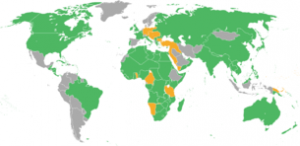
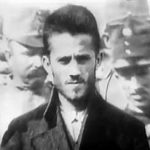 Countless wars have been fought over one nation’s ruler being killed by someone from another nation. War will be a part of our world until the end of time, but that in no way lessens the worry, fear, and sadness that war always brings. Still, like the Allies of World War I, we cannot let one group or nation hold power over another group or nation…which also explains the need to destroy ISIS.
Countless wars have been fought over one nation’s ruler being killed by someone from another nation. War will be a part of our world until the end of time, but that in no way lessens the worry, fear, and sadness that war always brings. Still, like the Allies of World War I, we cannot let one group or nation hold power over another group or nation…which also explains the need to destroy ISIS.
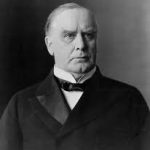 I find it very sad to think that if a person had some ailments or injuries in this day and age, they would likely have lived through the episode, but in days gone by, and for President McKinley, that was not to be the case.
I find it very sad to think that if a person had some ailments or injuries in this day and age, they would likely have lived through the episode, but in days gone by, and for President McKinley, that was not to be the case.
On September 6, 1901, while standing in a receiving line at the Pan-American Exposition in Buffalo, New York, McKinley was approached by Leon Czolgosz, a Polish-American anarchist carrying a concealed .32 revolver in a handkerchief. Czolgosz shot McKinley twice at close range. One bullet deflected off a suit button, but the other entered his stomach, passed through the kidneys, and lodged in his back. When he was operated on, doctors failed to find the bullet. That in and of itself was a very 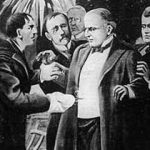 serious situation, but I believe it would have been survivable. Unfortunately for President McKinley, the doctors of that time had few, if any antibiotics to fight infection, and gangrene soon spread throughout the president’s body. McKinley died eight days later, on September 14, 1901. Czolgosz was convicted is of murder and executed soon after the shooting.
serious situation, but I believe it would have been survivable. Unfortunately for President McKinley, the doctors of that time had few, if any antibiotics to fight infection, and gangrene soon spread throughout the president’s body. McKinley died eight days later, on September 14, 1901. Czolgosz was convicted is of murder and executed soon after the shooting.
These days, there have been a number of people who have had injuries far more grave than President McKinley had, and yet they have come through with flying colors. I think it is irrelevant what a person’s politics are or whether you think President McKinley was a good president or a bad president, because this really isn’t about politics at all. The reality is that this man died largely because of a lack of modern medicines that could 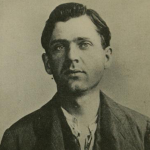 have easily cured the gangrene he had from the shooting, or in most cases, prevented it all together.
have easily cured the gangrene he had from the shooting, or in most cases, prevented it all together.
None of us likes to pay for the cost of some of the life-saving drugs that have been developed, but it is partly that cost that helps to pay for the research that goes into these new medicines. Whether we pay for them by donations before development or cost after development, really makes no difference. I know many people think that the drug companies gouge the patient, and I suppose that could be true to an extent, but which one of us has what it takes to find a medicine that cures some of the diseases we can cure today, that were a death sentence in years gone by?
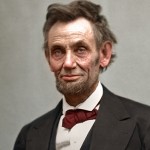 These days, when a new president makes the move from their current home to the White House, it is a huge production. Very little of the packing is actually done by the first family. Things were much different in 1861, when President Abraham Lincoln was moving to Washington DC. When Abraham Lincoln moved to Washington DC, he packed his family’s belongings himself. His wife Mary was in Saint Louis on a shopping trip, so she would join him later in Indiana. It was on this day, February 11, 1861 that Abraham Lincoln boarded a two car private train…probably the only special thing about this transition. After an emotional speech to his fellow Springfield, Illinois citizens, Abraham Lincoln moved to Washington DC. The day was cold and rainy…much like the mood as Lincoln left his friends. He spoke to a crowd before departing: “Here I have lived a quarter of a century, and have passed from a young man to an old man. Here my children have been born, and one is buried. I now leave, not knowing when, or whether ever, I may return, with a task before me greater than that which rested upon Washington. Without the assistance of that Divine Being…I cannot
These days, when a new president makes the move from their current home to the White House, it is a huge production. Very little of the packing is actually done by the first family. Things were much different in 1861, when President Abraham Lincoln was moving to Washington DC. When Abraham Lincoln moved to Washington DC, he packed his family’s belongings himself. His wife Mary was in Saint Louis on a shopping trip, so she would join him later in Indiana. It was on this day, February 11, 1861 that Abraham Lincoln boarded a two car private train…probably the only special thing about this transition. After an emotional speech to his fellow Springfield, Illinois citizens, Abraham Lincoln moved to Washington DC. The day was cold and rainy…much like the mood as Lincoln left his friends. He spoke to a crowd before departing: “Here I have lived a quarter of a century, and have passed from a young man to an old man. Here my children have been born, and one is buried. I now leave, not knowing when, or whether ever, I may return, with a task before me greater than that which rested upon Washington. Without the assistance of that Divine Being…I cannot 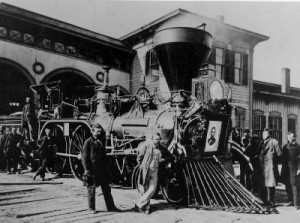 succeed. With that assistance, I cannot fail. To His care commending you, as I hope in your prayers you will commend me, I bid you an affectionate farewell.” One of the people who attended the speech, said that the president-elect’s “breast heaved with emotion and he could scarcely command his feelings.”
succeed. With that assistance, I cannot fail. To His care commending you, as I hope in your prayers you will commend me, I bid you an affectionate farewell.” One of the people who attended the speech, said that the president-elect’s “breast heaved with emotion and he could scarcely command his feelings.”
It’s hard to say if Lincoln had an inkling that he was not just saying “goodbye for now” to the citizens of Springfield, Illinois, or not, but there is no doubt that he knew that his presidency was going to be difficult…to say the least. Since his election, seven southern states has seceded from the Union. The nation was in the middle of a national crisis. President Lincoln knew that the nation was quite likely heading for a civil war. In short order, he was proven to be correct, when our nation embarked on one of the most bitter wars it ever fought…waged against its own people, over slavery.
When Lincoln said that it was possible that he would never return to Springfield, he was ironically very correct. 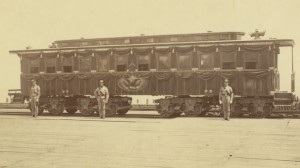 While he returned in body, he did not return in life…as we all know, because he was shot by John Wilkes Booth on April 14, 1865, and died at 7:22am the morning of April 15, 1865. Booth opposed Lincoln’s freeing of the slaves, and maybe felt like killing him would somehow change that. Of course, it did not. After his passing, Lincoln’s body made a two week train trip back to Springfield, Illinois for burial, taking a route that would allow the people to pay tribute along the way. Memorial services were held at different towns when the train passed through them. It was the only time he rode in the new private train car that had been built just for him.
While he returned in body, he did not return in life…as we all know, because he was shot by John Wilkes Booth on April 14, 1865, and died at 7:22am the morning of April 15, 1865. Booth opposed Lincoln’s freeing of the slaves, and maybe felt like killing him would somehow change that. Of course, it did not. After his passing, Lincoln’s body made a two week train trip back to Springfield, Illinois for burial, taking a route that would allow the people to pay tribute along the way. Memorial services were held at different towns when the train passed through them. It was the only time he rode in the new private train car that had been built just for him.
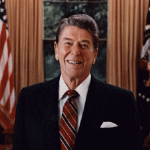 When a United States president is assassinated, it sends shock waves around the world. When one is shot and lives, it sends waves of shock too…and then relief. I was a little girl when John F Kennedy was shot and killed on November 22, 1963, and I will never forget where I was when I found out about it. At the tender age of just seven years, I don’t really think that I fully understood the gravity of the situation. When President Ronald Regan was shot in the chest, on March 30, 1981, I was a married twenty five year old mother of two daughters, and I fully understood the gravity of the situation, and how it could have affected our nation and the world. It was however, the reason he was shot that totally baffled me. I mean, I know what John Hinkley Jr’s deranged reasons were, but it still made no sense to me…especially that he would think that somehow he would win Jodie Foster’s love by shooting the president. I suppose that is simply how the deranged mind works.
When a United States president is assassinated, it sends shock waves around the world. When one is shot and lives, it sends waves of shock too…and then relief. I was a little girl when John F Kennedy was shot and killed on November 22, 1963, and I will never forget where I was when I found out about it. At the tender age of just seven years, I don’t really think that I fully understood the gravity of the situation. When President Ronald Regan was shot in the chest, on March 30, 1981, I was a married twenty five year old mother of two daughters, and I fully understood the gravity of the situation, and how it could have affected our nation and the world. It was however, the reason he was shot that totally baffled me. I mean, I know what John Hinkley Jr’s deranged reasons were, but it still made no sense to me…especially that he would think that somehow he would win Jodie Foster’s love by shooting the president. I suppose that is simply how the deranged mind works.
In the years that the United States has been a nation, sixteen assassination attempts on our presidents. Of those, there have been four successful Presidential assassinations. They were Lincoln, Garfield, McKinley, and Kennedy. I really never thought there might have been that many attempts, but I can see that people get distraut with how things are going, and if they are at all unstable, they might attempt to shoot the president.
President Reagan’s shooting was probably one of the most strange, because he appartently didn’t feel the .22 caliber bullet that entered his chest, narrowly missing his heart, and hit his lung. There were three attendants with him, who were also hit. They were White House Press Secretary James Brady, Secret Service agent Timothy McCarthy, and DC police officer Thomas Delahaney. Hinkley was then overpowered and pinned against a wall. Reagan was shoved into the car and taken to the hospital for treatment. He made a complete recovery, which was amazing, considering that he was 70 years old at the time. He even insisted on walking into George Washington University Hospital under his own power. He was in good spirits and visiting with his wife, Nancy while waiting for surgery. He laughingly said, ”Honey, I forgot to duck,” and to his surgeons, “Please tell me you’re Republicans.”
The next day, he resumed some of his executive duties and even signed a piece of legislation from his hospital bed. He returned to work at the White House on April 11, 1981. He returned even more popular that he already was, and received a hero’s welcome by Congress. His highly successful economics plan was passed with several Democrats breaking ranks to back his plan. Nevertheless, President Reagan felt the effects of the shooting for years afterward. The other men eventually recovered, but James Brady suffered permanent brain damage and later became an advocate for the “Brady Bill” requiring a five day waiting period and background checks before the purchase of a gun, which was signed into law by President Bill Clinton. John Hinkley received a verdict of “not guilty by reason of insanity” bringing with it outrage among the people of this nation. He has been incarcerated at Saint Elizabeth’s Hospital since that time, but more recently has been allowed supervised home visits with his parents. I suppose that one day, he could be released, since they have said that his mental illness is in remission.

